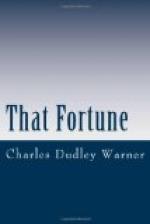“You will need all the tools you can get the use of, my boy, in the struggle,” was the advice of his mentor, “and the things you will need most may be those you have thought least of. I never go fishing without both fly and bait.”
Philip was always grateful that before he entered college he had a fine reading knowledge of French, and that he knew enough German to read and enjoy Heine’s poems and prose, and that he had read, or read in, pretty much all the English classics.
He used to recall the remark of a lad about his own age, who was on a vacation visit to Rivervale, and had just been prepared for college at one of the famous schools. The boys liked each other and were much together in the summer, and talked about what interested them during their rambles, carrying the rod or the fowling-piece. Philip naturally had most to say about the world he knew, which was the world of books —that is to say, the stored information that had accumulated in the world. This more and more impressed the trained student, who one day exclaimed:
“By George! I might have known something if I hadn’t been kept at school all my life.”
Philip’s career in college could not have been called notable. He was not one of the dozen stars in the class-room, but he had a reputation of another sort. His classmates had a habit of resorting to him if they wanted to “know anything” outside the text-books, for the range of his information seemed to them encyclopaedic. On the other hand, he escaped the reputation of what is called “a good fellow.” He was not so much unpopular as he was unknown in the college generally, but those who did know him were tolerant of the fact that he cared more for reading than for college sports or college politics. It must be confessed that he added little to the reputation of the university, since his name was never once mentioned in the public prints—search has been made since the public came to know him as a writer—as a hero in any crew or team on any game field. Perhaps it was a little selfish that his muscle developed in the gymnasium was not put into advertising use for the university. The excuse was that he had not time to become an athlete, any more than he had time to spend three years in the discipline of the regular army, which was in itself an excellent thing.
Celia, in one of her letters—it was during her first year at a woman’s college, when the development of muscle in gymnastics, running, and the vigorous game of ball was largely engaging the attention of this enthusiastic young lady—took him to task for his inactivity. “This is the age of muscle,” she wrote; “the brain is useless in a flabby body, and probably the brain itself is nothing but concentrated intelligent muscle. I don’t know how men are coming out, but women will never get the position they have the right to occupy until they are physically the equals of men.”
Philip had replied, banteringly, that if that were so he had no desire to enter in a physical competition with women, and that men had better look out for another field.




